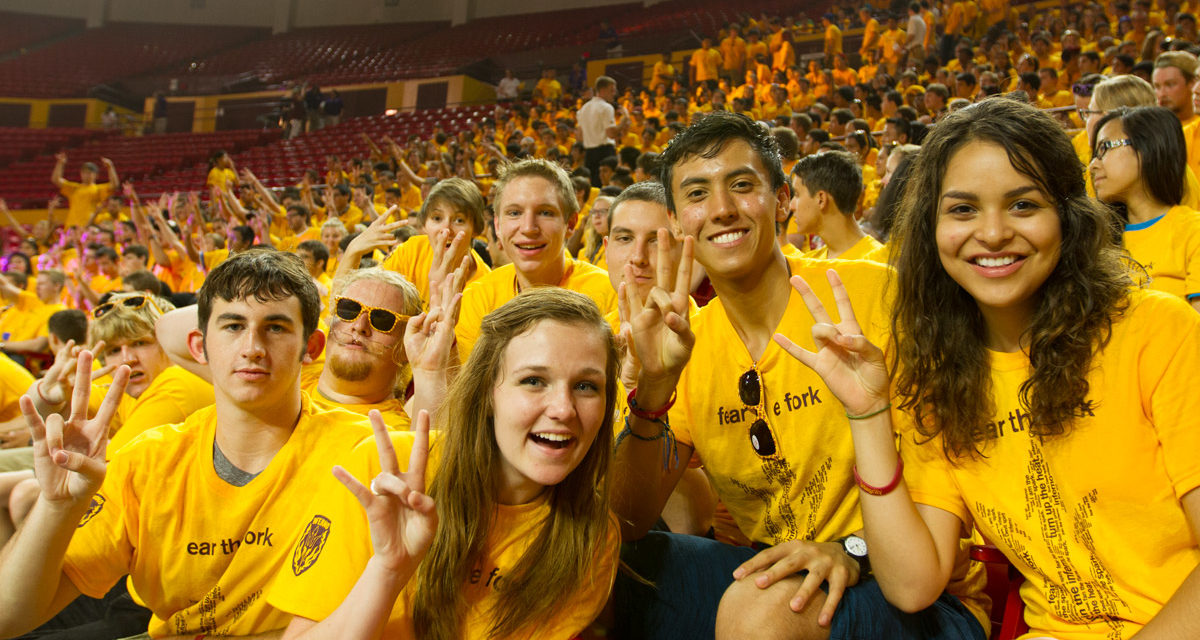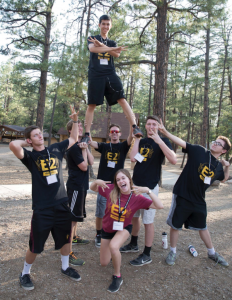
Re-engineering the student experience


Students strike out on their individual paths of discovery starting at
E2 camp, an off-campus experience running throughout the month
of August.
The student experience and the core belief that students need more than traditional coursework to be competitive and successful in their engineering career are some of the top priorities at the Ira A. Fulton Schools of Engineering, and what sets it apart. In the Fulton Schools, students have the opportunity to create their own unique path, complementing the knowledge their professors impart in the classroom with internships, research, community service and participation in student organizations.
It is a model of success that has contributed to phenomenal growth and rise in excellence. For the fifth consecutive year, the Fulton Schools enrolled a record number of freshmen with the incoming class totaling more than 2,500 students. With six schools offering more than 60 degree options, the overall student body has grown to nearly 17,000 strong, granting more than 2,500 degrees in 2013-2014. But the Fulton Schools have grown not only in size, but renown and opportunities as well.
Now ranked in the top 25 percent of undergraduate engineering programs by U.S. News & World Report, the Fulton Schools can offer new and innovative experiences to tomorrow’s engineers enhancing its reputation in tandem with its ever-increasing student population.
“One of the things we learned early on, and it’s particularly true with how many students we have, is that they all have different interests and passions and they all need different pathways to graduation,” said Paul Johnson, dean emeritus of the Fulton Schools of Engineering.
Determining those different pathways is all about providing diverse learning experiences for students, so they can discover their passion or drive, and ultimately what becoming an engineer means to them.
It all starts with E2, more than your typical orientation
Students strike out on their individual paths of discovery starting at E2 camp, an off-campus experience running throughout the month of August. Established in 2008, E2 sends students to camps near Prescott, Arizona, for two or three days to meet staff, faculty, upperclass mentors and other incoming freshmen. The camps serve as an introduction to the Fulton Schools; students participate in team building, critical thinking and problem solving exercises, offering them the rst taste of their engineering education.
“The fact that it’s off campus shows that we want students to think about their experience in the Fulton Schools as more than just the in-classroom experience,” said Carrie Robinson, associate director of academic achievement.
The off-campus setting and overall messaging of E2 goes a long way in setting the tone of the Fulton experience for students. It instills in students that they are engineers from day one, that experiential learning is paramount to their development and that vital lessons can take place outside of the classroom.
“Getting to meet their instructor for Intro to Engineering before classes start can help them to see instructors as people, and not just a talking head in front of the classroom,” said Robinson.
In addition to introducing students to the Fulton Schools community and experience, another goal of E2 is to get students involved in the community, be it through student organizations, competitions, undergraduate research or local community engagement opportunities.
“The students going to the camps learn about the activities that camp counselors, students a year or two older than them, are involved in and passionate about,” said Jim Collofello, associate dean for Academic and Student Affairs. “The result is that when they come back to campus, it’s in their mindset to get involved.”
Learning and living together
Upon leaving E2 and starting classes, students enter their residential community, where students live and learn together grouped by school. On the Tempe campus Fulton Schools freshmen are housed together in University Towers and Palo Verde East, as well as Barrett Honors College community.
In July 2014, the Polytechnic School, located in Mesa, Arizona, officially became a part of the Fulton Schools community. Formerly the College of Technology and Innovation, the Polytechnic School adds a host of new programs and majors to the Fulton Schools. Students in the Polytechnic School reside in Century Hall.
By grouping Fulton Schools students together in the same residence hall, the sense of community fostered at E2 can continue to grow.
“Though we have a really strong identity on the Polytechnic campus, one of the things that has been exciting is to work with the dean and the other directors and think of interesting ways we can build collaborations across the schools,” said Ann McKenna, director of the Polytechnic School.
Maintaining a sense of community and collaboration provides a support system that encourages students to explore the wide array of opportunities within the Fulton Schools.
Engineering a career
“When Fulton Schools students step onto the ASU campuses, they’re going to hear about how to connect with their passion and there are resources to do that,” said Robin Hammond, founding director of the Fulton Schools Career Center.
The Fulton Schools Career Center is dedicated to helping students find their passion within the world of engineering and technology by providing career coaches, workshops and events. The center aims to have students ready for an internship within their first four semesters, not only so they can sample different aspects of engineering but also so they’ll have the required experience employers look for in a candidate.
“We’re very focused on helping students understand what engineers do, what’s inspiring about what engineers do, and how they can meet and connect with people to build on those interests,” said Hammond.
Solving engineering problems through research
One way students are encouraged to explore their interests is through the number of programs Fulton Schools offers to engage students outside of the classroom.
“All these programs are geared toward developing skills that employers want, but aren’t necessarily gained in the classroom,” said Amy Sever, associate director of Undergraduate Engagement.
The Fulton Undergraduate Research Initiative (FURI), for example, is a research program that allows undergraduate students to work and connect with a faculty member on a funded research project.
“Many of the students in the program are thinking about graduate school, so it gives them a look at what it means to be on a research team,” said Sever.
While cutting their teeth on a research project and research processes, students learn valuable skills, like proposal writing, and can present their research findings at the semi-annual FURI Symposium.
Another program is Engineering Projects in Community Service, (EPICS) which pairs multidisciplinary teams of students from various engineering majors with a project that helps a community, nonprofit or government agency solve an engineering problem. Students learn to draw up plans, pitch a budget, solicit funding, work with other disciplines and interface with a community member or organization.
“Through EPICS, students are learning ‘soft’ skills they might not pick up in a classroom — brainstorming, presentation skills, developing project plans and seeing them through to completion,” said Sever. “They get the opportunity to assess and meet a customer’s need.”
EPICS also provides a community service opportunity and shows students how engineering can make a difference in the world. House of Refuge, a nonprofit organization that provides transitional housing and support to homeless families, has partnered with multiple EPICS teams to improve and strengthen their facilities.
While some students are actively working to improve the local community, there are also opportunities to tackle global engineering problems through the National Academy of Engineering’s Grand Challenge Scholars program. ASU is one of 20 universities participating in the program, which invites top freshman students to study and 10 develop solutions for a range of technological and engineering advances that will improve the world in the future. Students are pushed to look at the interdisciplinary and global nature of these challenges as well, prompting them to approach the problem from a different perspective and broaden their mindset.
Collaborating outside the classroom
There are also approximately 60 student organizations, clubs and competitive teams that provide outlets for students’ interests and creativity. Everything from honors organizations, to major-specific groups with national affiliations to clubs dedicated to specific endeavors such as robotics and aeronautics are represented.
In addition to clubs and organizations that tap into individual interests, the Fulton Schools is home to organizations like Advancing Women in Construction (AWIC) and Advancing Minorities in Construction (AMIC), which seek to support female and minority students by connecting them with industry mentors.
“When students are ready to engage, there’s a safety net, a group out there that’s willing and ready to be an advocate for them,” said Matt Eicher, assistant director of the School of Sustainable Engineering and the Built Environment.
After a concerning number of Native American students were leaving the construction program, one safety net was founded. Construction in Indian Country, a nonprofit organization, is a collaborative group focused on quality management among American Indian sovereignties and providing educational opportunities for American Indian students. Now the Del E. Webb School of Construction has one of the highest Native American student populations in the nation.
To date, Construction in Indian Country has raised approximately $300,000 toward scholarships for Native American students in construction, according to Edd Gibson, director of the School of Sustainable Engineering and the Built Environment.
Transferring to the Fulton Schools of Engineering
There are a variety of programs and initiatives that focus on acclimating transfer or nontraditional students to the college. A newly established Transfer Success in Engineering class was designed to introduce first- semester transfer students to resources and opportunities. The needs of transfer students ranging from those coming from a community college, a different university, professionals with years of experience who simply need a degree or veterans are taken into account.
“We offer an array of options to students, knowing they come in with varied backgrounds and are looking for different experiences so they can customize their experience at ASU,” said Robinson.
Building the ‘Fulton Difference’
All of the programs and opportunities that engage students creatively, socially and educationally are geared toward crafting a well-rounded experience at the Fulton Schools. A diverse experience leads to a unique résumé that sets Fulton Schools students apart.
“I always tell students that in their first job interview, interviewers are going to spend 30 seconds on that top third of the résumé — their name, address, major and GPA. The remaining 29 and a half minutes are going to be focused on everything beneath that — the things that you did outside the classroom,” said Johnson. “That’s when students get to talk about their experiences, that’s when their passion comes out, who they are, what they care about and their ability to accomplish their goals.”
Looking to the future, the Fulton Schools are focused on expanding opportunities for students to explore their interests and in turn, produce the best engineers possible.
“Our goals are to continue to grow a portfolio of engagement opportunities for our students. We’re adding more student organizations, more competitions, and more opportunities to be engaged both in and out of the classroom,” said Collofello. “We’re hoping more and more students will take advantage of these opportunities as they find something that specifically appeals to them.”



































